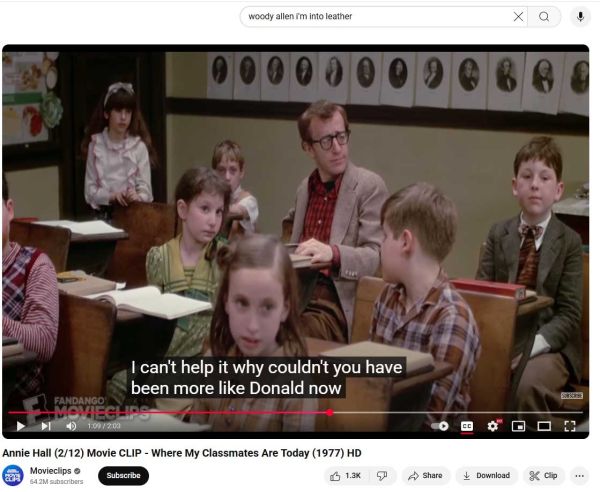Newspapers in Germany3: Woody Allen in Annie Hall
Annie Hall and Endless Therapy Sessions
This article "Die ewige Sitzung" (the endless therapy-session) appeared in the Sunday edition of Die Welt on November 28, 2021. Woody Allen lies on an anylyst's couch complaining about his girlfriend, played by Diane Keaton—from the movie Annie Hall. This scene is actually filmed split-screen, with Keaton complaining to her psychiatrist about Allen. In Germany, Annie Hall was released under the title Der Stadtneurotiker, or "The Urban Neurotic." The way the film plays out, the neurotic could be either of them, if not both.
The remarkable article talks about how much psychiatric intervention has appeared in feature films. I can think of several right away: Spellbound, starring Gregory Peck and Ingrid Bergman, directed by Alfred Hitchcock; The Seventh Veil starring Ann Todd and James Mason, directed by Compton Bennett, and the ultimate psychological classic Persona, starring Liv Ullmann and directed by her lover, Ingmar Bergman.
My reader can find excerpts from Annie Hall onYouTube to judge its humor and inventiveness. Allen inserts himself into fantasies about his childhood. His classmates make predictions about their own lives that are sort of unsettling, but also visually stunning.
But I don't recommend sitting through all 93 minutes of Annie Hall. The main characters say their lines with no particular involvement. You can be neurotic and still have passion. The characters appear to talk at each other, rather than to each other. Their interactions lack urgency and an intimate level of involvement.
I once had a live-in girlfriend who became disoriented in the dark, perhaps from panic-attacks or nightmares. In the middle of the damn night, she would switch on the table-lamp beside the bed, looking scared. On other occasions, if I climbed out of bed in the middle of the night to go to the bathroom, she would grasp my arm with an unsettling whimper, still sound asleep. I don't see that kind of insecurity in Annie Hall. I can't see an intimate aura in the characters' relations.


